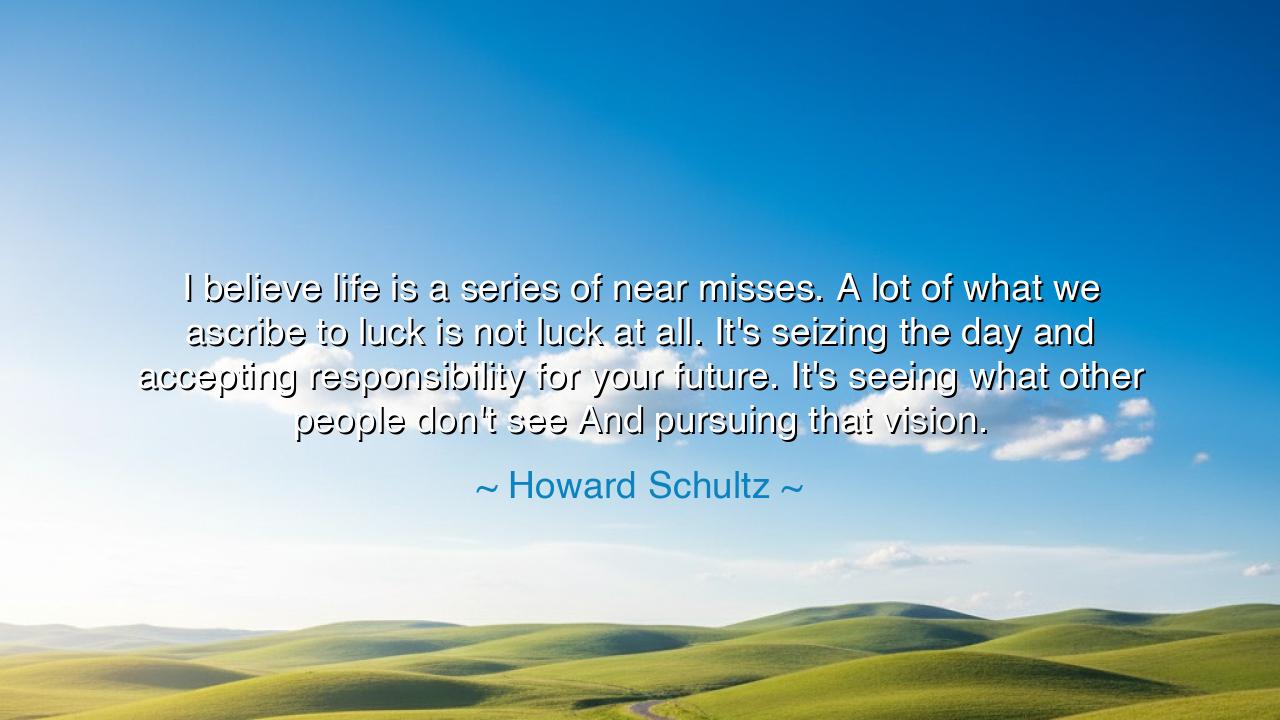
I believe life is a series of near misses. A lot of what we
I believe life is a series of near misses. A lot of what we ascribe to luck is not luck at all. It's seizing the day and accepting responsibility for your future. It's seeing what other people don't see And pursuing that vision.






"I believe life is a series of near misses. A lot of what we ascribe to luck is not luck at all. It's seizing the day and accepting responsibility for your future. It's seeing what other people don't see And pursuing that vision." With these words, Howard Schultz speaks to the profound truth that life is not governed by random chance, but by the choices we make, the actions we take, and the vision we choose to pursue. What many call luck is often the result of careful observation, taking responsibility, and recognizing opportunities where others may not. Schultz's words urge us to seize the day, to take control of our destiny, and to see possibilities that are hidden in plain sight—only visible to those who are willing to look with a discerning eye.
In the ancient world, the idea that fortune favors the bold was a widely accepted truth. Heraclitus of Ephesus, the philosopher of change, spoke of the constant flow of life, where those who could perceive the underlying forces of the world would be the ones to succeed. He believed that the universe was not random but that patterns could be discerned by those with the wisdom to see beyond the surface. The Romans also understood this, as they honored the goddess Fortuna, who was not just a figure of luck, but also one who rewarded courage, wisdom, and responsibility. Fortuna’s favor was not bestowed upon the passive, but upon those who took bold action in their lives. Similarly, Schultz’s belief that luck is a result of seizing the day and responsibility echoes the wisdom of the ancients: fortune is created, not found.
The concept of near misses is central to Schultz’s quote. It suggests that the path to success is not always marked by grand moments of fate, but by a series of small decisions, missed opportunities, and fortunate turns that could have easily gone unnoticed. Socrates understood this well. In his life, he spoke not of great achievements, but of the small, incremental steps toward understanding and wisdom. The great philosopher found wisdom in seizing every moment—not waiting for a perfect opportunity but recognizing that every moment, even those that seemed insignificant, held the potential to shape the future. His life was not defined by sudden strokes of luck, but by his consistent commitment to inquiry and personal responsibility, which ultimately led to a profound legacy.
Consider the story of Thomas Edison, whose numerous failures and near-misses became the foundation for his eventual triumph. Edison is often regarded as the epitome of success, but behind his inventions lay thousands of experiments that did not work. Yet, he never saw them as failures; instead, he recognized them as opportunities—near misses that brought him closer to the breakthroughs that would change the world. Edison’s vision was clear: he saw what others could not, and through relentless persistence and responsibility for his own future, he pursued that vision despite the countless setbacks. His life is a testament to the idea that success is not just about being lucky, but about being able to see beyond immediate obstacles and recognize the potential in what others overlook.
The lesson of Schultz’s words is one of active participation in life. It is easy to attribute success to luck, to wait for the stars to align or for fate to intervene. But as Schultz reminds us, success comes from seizing opportunities, acting with purpose, and taking responsibility for one’s own future. Like Alexander the Great, who didn’t wait for opportunity to come to him but carved out his path through bold actions, we too must take ownership of our destiny. We must train ourselves to see what others do not, to spot the hidden opportunities in our daily lives, and to pursue them with resolve and vision.
In our own lives, we must stop waiting for fortune to smile upon us. Instead, we should actively seek to create our own luck by embracing the responsibilities that come with our ambitions. Stop seeing failure as a defeat and instead view every near miss as a step toward greater understanding and success. Like Socrates, who relentlessly questioned the world around him to uncover deeper truths, we must cultivate a mindset that constantly seeks to learn, to grow, and to seize the day. Every opportunity, no matter how small, is a chance to move closer to our goals.
Let us live with the awareness that life is shaped by the choices we make, not by the randomness of fate. Recognize your responsibility in the unfolding of your future, and remember that success is not a gift from luck, but the product of vision, action, and perseverance. The future belongs to those who are willing to see beyond the obvious, to take ownership of their journey, and to persist when others might turn away. Like the great figures of history, we too can transform our future by actively engaging with the world around us, shaping our destiny through each small decision we make.






AAdministratorAdministrator
Welcome, honored guests. Please leave a comment, we will respond soon